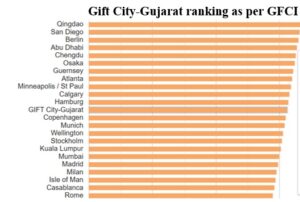
In an era where global capital still gravitates towards established centers, Gujarat International Finance Tec City seeks to prove that vision, intent, and execution can reshape a nation’s global standing. Conceived by then Gujarat Chief Minister Narendra Modi in 2007 and formally established in 2015, GIFT City began trading operations in 2024. It is India’s first International Financial Services Centre (IFSC), designed as a Special Economic Zone to offer world-class infrastructure, regulatory clarity, and a business ecosystem comparable with Singapore, Hong Kong, or Switzerland.
By December 2024, the city had attracted more than 760 entities — up sharply from 200 just seven months earlier. These include two international stock exchanges, over 85 banks and fintech firms, 80-plus capital market intermediaries, 37 insurance companies, and more than 140 investment funds, alongside IT and service companies.
READ I US-India trade: Weaponised tariffs put export growth at risk
Infrastructure and regulatory edge
GIFT City offers single-window access to domestic and global markets, with round-the-clock trading of global stocks. It allows financial transactions in multiple foreign currencies, reducing dependence on offshore hubs such as London or Singapore. Regulatory oversight is unified under the International Financial Services Centres Authority (IFSCA), which draws powers from the RBI, SEBI, and IRDAI—providing a degree of coherence often missing in India’s fragmented regulatory structure.
The city also offers unique jurisdictional advantages: it is treated as overseas for exchange-control purposes but as domestic for taxation. This hybrid status allows significant tax savings—estimated at up to $1.8 billion annually for companies. Incentives include 100% tax exemption for 10 years and no capital gains tax, making it an attractive destination for fund managers, insurers, and global financial service providers.
Standing against global peers
To understand GIFT City’s positioning, it is instructive to compare it with established hubs such as Hong Kong, Singapore, and Switzerland. One of its clearest advantages lies in regulation. While Singapore and Hong Kong operate under multiple regulators—the Monetary Authority of Singapore and the Hong Kong Monetary Authority, respectively—GIFT benefits from a unified oversight structure under the IFSCA. This reduces duplication, speeds up approvals, and creates a simpler compliance environment for new entrants.
Taxation is another differentiator. Companies operating in GIFT City enjoy exemptions unmatched by peers. Singapore levies a corporate tax of 17 percent, Hong Kong 16.5 percent, and Switzerland between 12 and 24 percent. By contrast, GIFT offers 10 years of complete tax exemption and imposes no capital gains tax. This is a deliberate attempt to match or surpass the fiscal incentives that once drew Indian capital flows through Mauritius or Cayman Islands.

Cost is a further advantage. While Singapore, Hong Kong, and Switzerland boast efficient infrastructure, they also carry high costs of living and operations. GIFT City, by contrast, is still developing its infrastructure but offers a relatively affordable operating environment—something that could appeal to startups, mid-sized financial firms, and global back-offices seeking cost-effective alternatives.
The talent pool is another differentiating factor. India has a young and growing workforce, while hubs such as Switzerland and Hong Kong rely on mature or even ageing professionals. GIFT City still has to prove that it can retain highly skilled financial talent, but its demographic advantage suggests a long-term strength.
Finally, time-zone advantage matters. India’s position at GMT+5:30 allows overlap with Asian, European, and African markets. This makes GIFT City a potential bridge between East and West—an edge that neither Singapore nor Switzerland can fully replicate.
Aligning with national ambitions
The development of GIFT City aligns with the government’s “Viksit Bharat @2047” vision of building globally competitive institutions. The IFSC is positioned to channel investment into India through well-structured and tightly governed mechanisms, strengthening capital markets and funding technology-driven growth. For decades, global investors routed funds through Mauritius, Singapore, or Cayman Islands to benefit from tax advantages. GIFT City offers a credible onshore alternative within India’s jurisdiction.
High Net-Worth Individuals and Non-Resident Indians are among the early adopters, drawn by regulatory ease, liquidity, and long trading hours. Resident investors now also gain access to global equities, bonds, and alternative financial products—something previously possible only through offshore vehicles.
Expanding beyond finance
GIFT City is also pitched as a multidisciplinary hub. Apart from finance and insurance, it seeks to attract investment in biotechnology, artificial intelligence, robotics, and IT-enabled services. Incentives such as tax breaks, simplified compliance, and subsidies are designed to pull companies and startups that would otherwise have looked to foreign jurisdictions.
The Global Financial Centres Index (GFCI) ranked GIFT City 46th in 2024 with a score of 706, a notable climb given its young age compared to centuries-old peers. As infrastructure matures and more institutions set up operations, its standing is expected to rise further.
Despite its promise, challenges remain. The city needs to deepen its financial ecosystem, retain talent, and ensure regulatory stability. The image of India as a back-office rather than a hub for high-end financial services will take time to overturn. Success will depend on balancing incentives with credible governance, and on sustaining investor confidence in India’s broader economic and policy environment.
From vision to execution, GIFT City is more than an infrastructure project. It is a test case for India’s ability to create globally competitive ecosystems within its borders. If nurtured carefully, it can help curb financial brain drain, anchor international investment flows, and position India not just as a service provider, but as a genuine global financial hub.
Piyalee Bhattacharya is a Research Scholar, and Dr Asheesh Pandey Professor at Indian Institute of Foreign Trade, New Delhi.
